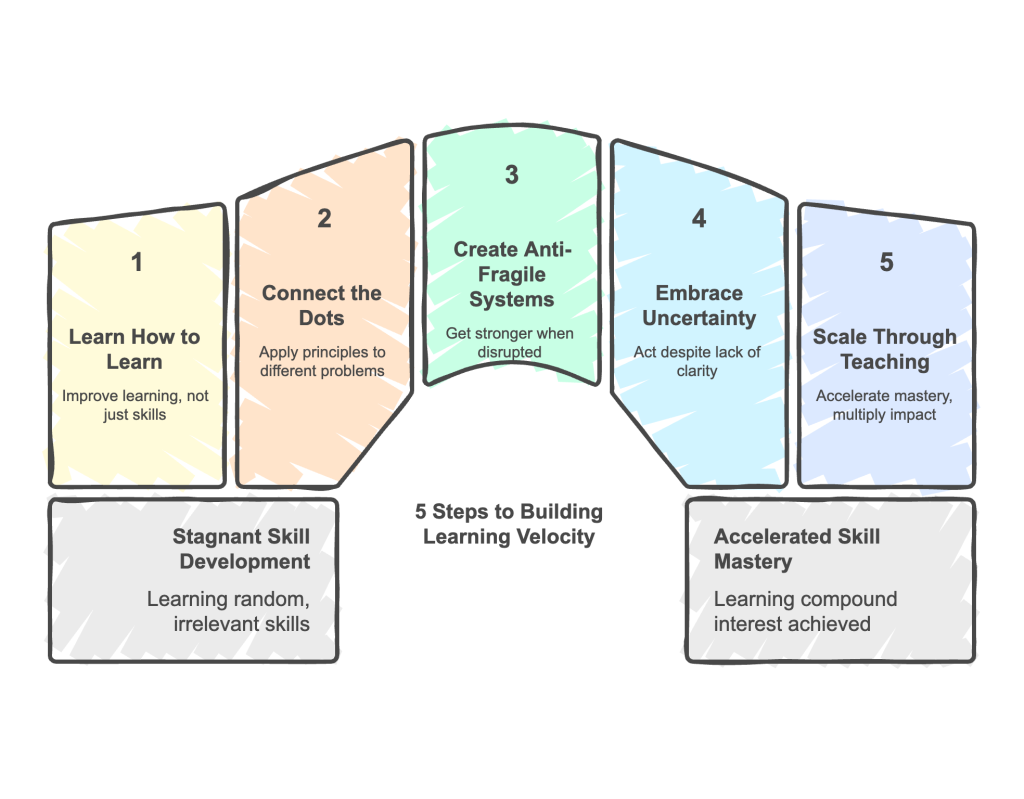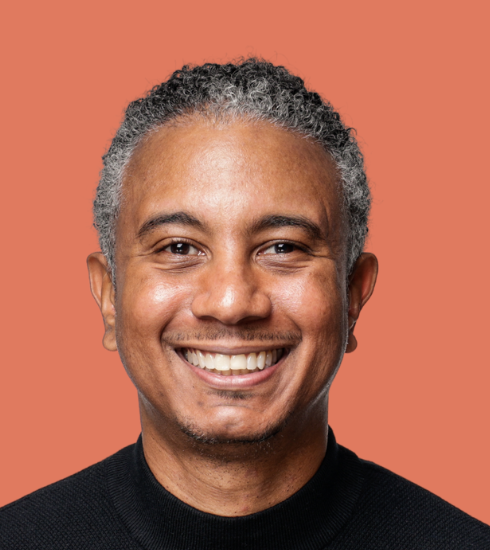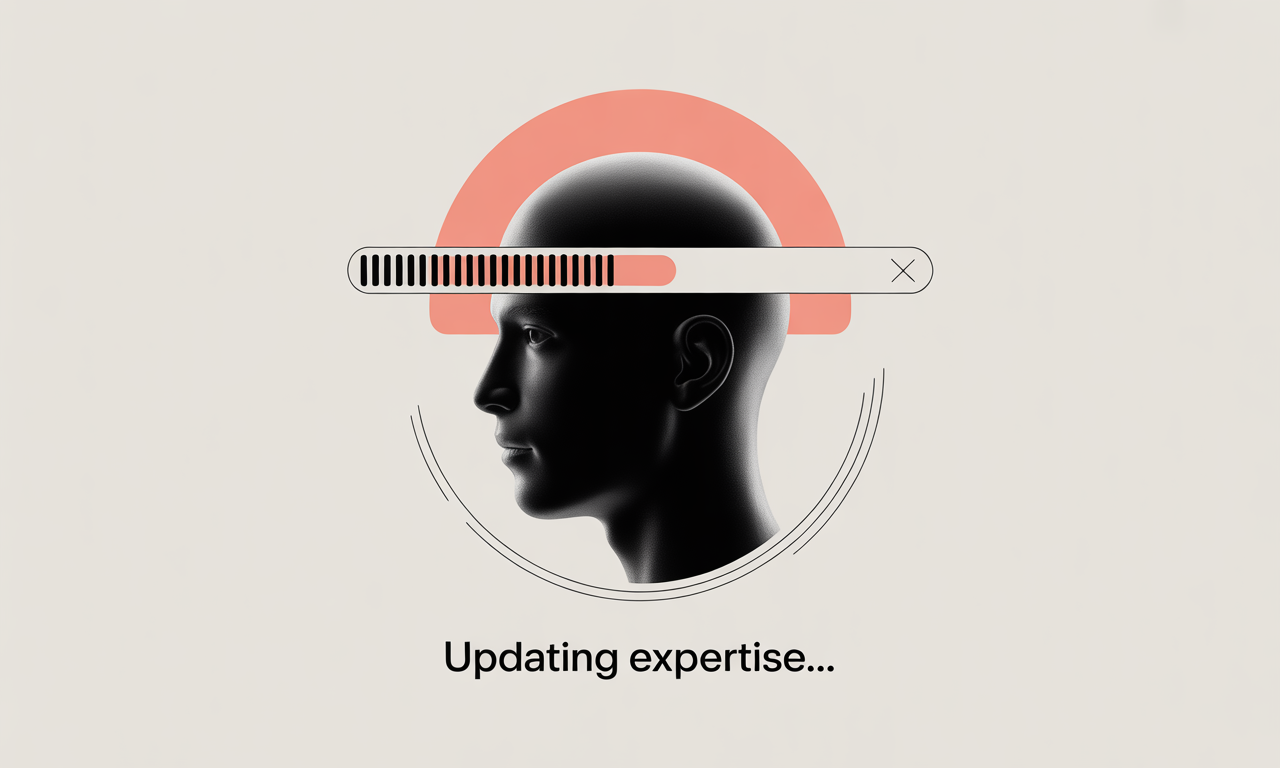I’ve always been a bit of a generalist.
While my colleagues were diving deep into their specializations, I was the guy reading everything from behavioral economics to supply chain optimization to leadership theory. Some people called it unfocused. I called it survival.
About eight years ago, I had one of those moments that changes everything.
I was sitting in a strategy meeting, watching really smart people — experts in their fields — struggle to adapt to changes that seemed pretty obvious to me. These weren’t dumb people. They were brilliant at what they did.
But what they did was becoming less relevant by the month.
And here’s the uncomfortable truth I felt but didn’t say out loud:
I wasn’t immune either. I was terrified that my curiosity — the one thing that made me different — might be mistaken for a lack of focus.
Your expertise is expiring faster than Apple drops new iPhones.
While everyone obsesses over the next hot skill to learn, the people who are going to smash it through 2030 are mastering something completely different.
They’re developing meta-skills — the learning and adaptation capabilities that amplify every other skill.
And this shift? It’s not coming. It’s already here.
The Expertise Trap Is Real
Right now, 39% of current skills are transforming by 2030. Let that sink in.
Nearly half of what you know how to do today will be different — or irrelevant — in five years.
I see this playing out everywhere. Over the past few years, I’ve watched leaders who know AI exists but are afraid to take that first step. They’re waiting for the “right” course, the “complete” understanding, the “perfect” moment to dive in.
Meanwhile, others — often not the smartest in the room — are just being messy and curious. They play with tools. They fail. They learn. They move.
These are the people who will win.
Not because they’re smarter, but because they’ve mastered the meta-skill that matters most: learning velocity.
Daniel Coyle puts it perfectly in his book The Culture Code:
“One of the best measures of any group’s culture is its learning velocity — how quickly it improves its performance of a new skill.”
Not expertise velocity. Learning velocity. (I just love that term. It sound so bad ass. Thanks Dan.)
Culture doesn’t just eat strategy for breakfast anymore — it rewrites the menu.
What Meta-Skills Are (And Why They Beat Expertise)
Meta skills are considered to be higher order, innate and timeless skills. Stuff like self awareness, resilience, adaptability and being able to learn. Think of them as enablers that help you to learn specific hard and soft skills. They can go with you no matter what industry or job that you’re in.
Here’s what I’ve learned from watching hundreds of professionals navigate change: Those who optimize for specific skill mastery are playing a completely different game than those who optimize for learning velocity and adaptability.
When disruption hits — and it always hits — the professionals with strong meta-skills have something their specialized colleagues don’t: transferable capabilities.
- Pattern recognition across domains
- Rapid skill acquisition frameworks
- The ability to learn, unlearn, and relearn faster than change itself
As Robert Greene says in The Daily Laws:
“Learning how to learn is the most important skill to acquire.”
In a world where specific skills have expiration dates, meta-skills compound forever.
The ability to learn becomes more valuable than any particular thing you’ve learned.
The 5-Stage System to Build Learning Velocity
Here’s how to make this practical — five stages that shift how you think about professional development.

Stage 1: Learn How to Learn
Stop learning random skills. Instead start improving how you learn.
Research confirms that building skill sets fit for the future requires focusing on learning how to learn, not just learning specific skills.
Try this:
List three skills you’re currently developing.
Rate each on:
- Future relevance (1–10)
- Transferability (1–10)
- Your learning speed (1–10)
Now focus only on the ones with the highest totals.
Takes five minutes. Changes everything.
Stage 2: Connect the Dots
Every experience you have is a learning moment. Take the transferable principles and see where else you can apply them. Make your learning portable.
While analytical thinking remains the #1 sought-after skill, resilience and flexibility rank #2. That tells you something: adaptable pattern recognition beats domain-specific expertise.
Try this:
Think of one recent challenge you solved.
Write down three principles that could apply to completely different problems.
You just created transferable intellectual capital.
Stage 3: Create Anti-Fragile Learning Systems
Most people build systems that break under pressure. Smart professionals build “anti-fragile learning systems” — approaches that get stronger when disrupted.
As the Harvard Business Review puts it:
“Learning, not knowledge, will power organizations into the future; the central champion of learning should be the manager.”
Try this:
Identify one current system or habit.
Redesign it so it becomes stronger when things go sideways.
Stage 4: Make Uncertainty Your Competitive Edge
Uncertainty is your new competitive advantage.
Research from the Center for Creative Leadership shows that navigating uncertainty is now a core leadership capability.
Try this:
Identify one situation where you’re waiting for clarity before acting.
Design one small experiment to move forward despite the fog.
Stop waiting for perfect information. Start practicing intelligent action under ambiguity.
As Derek Sivers writes:
“Many people learn only in their first third of life… We don’t get wise just by adding and adding. We also need to subtract.”
And Alvin Toffler predicted it decades ago:
“The illiterates of the 21st century will not be those who cannot read and write but those who cannot learn, unlearn, and relearn.”
Sivers even gives us the three-step practice of deliberate unlearning:
- Doubt what you know.
- Stop the habit of thinking you know it.
- Require proof that it’s still true today.
The solution is deliberate unlearning.
Stage 5: Scale Your Learning Through Teaching
Your learning doesn’t scale until you teach it.
Research shows that individual adaptation must become organizational adaptation.
Try this:
Choose one meta-skill you’ve developed and teach it to one person this week.
Teaching accelerates your mastery while multiplying impact.
It’s learning compound interest.
The Eternal Learner Operating System
The most successful professionals I know have made a subtle identity shift — from an expert identity to a learning identity.
Instead of introducing themselves by what they know, they lead with how quickly they learn.
“I help teams adapt to emerging technologies” sounds very different from “I’m a data analytics expert.”
“Your whole life must be treated as a kind of apprenticeship to which you continually apply your learning skills.”
—Robert Greene
This isn’t about going back to school. It’s about making learning your operating system.
Try this:
Rewrite your LinkedIn summary to emphasize learning and adaptation rather than your current job title.
Watch how people respond differently.
How to Turn Failure Into Your Fastest Teacher
Most people think failure means you’re falling behind. The truth? It’s the accelerator pedal of meta-skills.
Research shows that professionals who embrace experimentation and intelligent failure develop capabilities faster than those who avoid mistakes.
The keyword is intelligent.
That means designing experiments with acceptable failure parameters, documenting lessons learned, and sharing those lessons as learning assets — not sources of shame.
When you systematize failure, you make it your fastest teacher.
Your First Step Toward Learning Velocity
Look, I get it.
This feels like throwing away everything you’ve worked to build — all that expertise, all those years of specialization.
But here’s the truth: You’re not throwing it away. You’re building on top of it.
I know because six years after graduation, social media hit.
I was consulting in digital marketing for platforms that didn’t exist when I was in school. No textbook. No playbook. Just change happening faster than anyone could keep up.
I realized: I could either wait to feel ready, or learn faster than things could change.
I chose learning velocity over expertise.
And everything shifted. I stopped feeling behind and started leading transformations for clients who were still waiting for someone to write the manual.
Your knowledge becomes the foundation for faster learning — not a prison that keeps you stuck.
The professionals who win over the next decade won’t be the ones who know the most today. They’ll be the ones who learn the fastest tomorrow.
Are you going to be one of them?
A: Meta-skills are foundational learning and adaptation capabilities that amplify every other skill. Unlike specific technical skills that expire, meta-skills like learning velocity, pattern recognition, and adaptive thinking compound forever and help you stay relevant as industries change.
A: Start by rating your current skills on future relevance, transferability, and learning speed. Focus on building systems that help you learn faster rather than accumulating more knowledge. Practice deliberate unlearning, embrace intelligent failure, and teach others what you learn to accelerate mastery.
A: Expertise velocity focuses on mastering specific skills deeply, while learning velocity focuses on how quickly you can acquire and adapt new skills. In rapidly changing fields, learning velocity becomes more valuable because it allows you to pivot when expertise becomes obsolete.
By 2030, 39% of current skills will be obsolete, making learning velocity more valuable than expertise. The Personal Innovation Method’s five stages—Learn How to Learn, Connect the Dots, Build Systems That Stick, Get Comfortable with Chaos, and Multiply Your Impact—help professionals shift from expert identity to eternal learner identity, enabling them to lead transformations rather than react to them.





